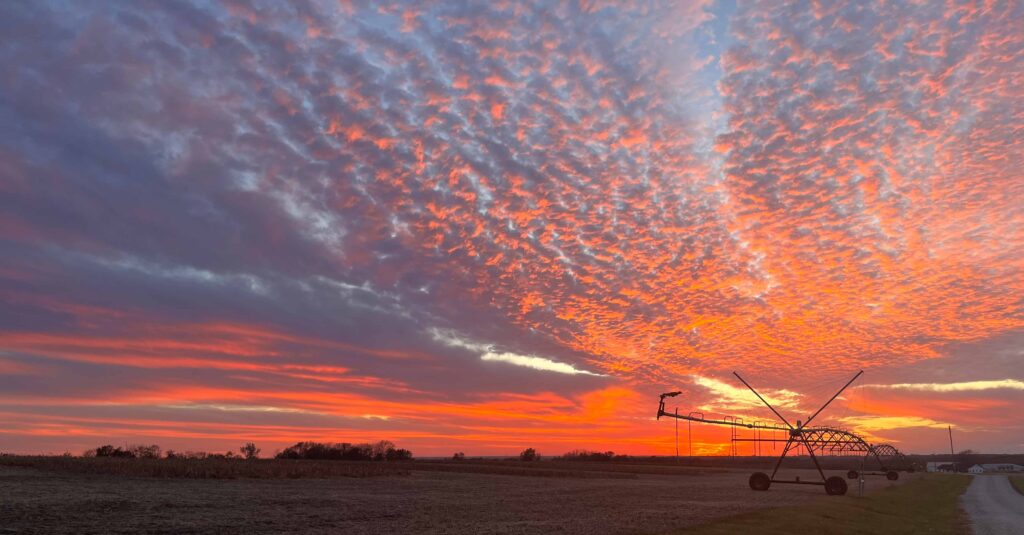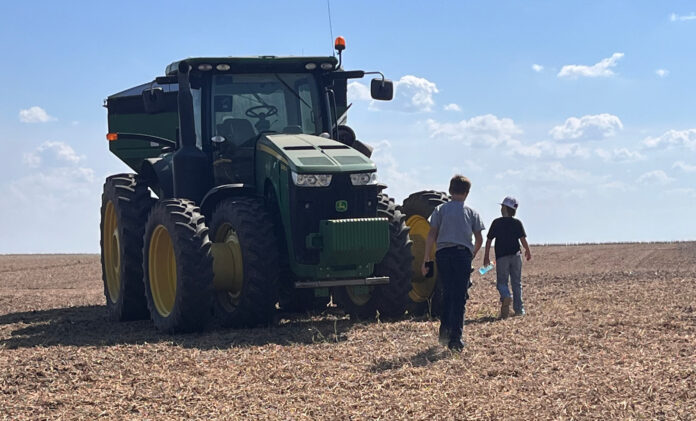By Elizabeth Webb
September is here, and with it comes cooler nights, shorter days, and in the farming communities, harvest season. While the harvest season doesn’t directly impact all of us, we all benefit from the farming family’s hard work. There are many transferable principles to the challenges we all face, like setting expectations, planning, knowing your surroundings, and the peril of comparison, all relatable aspects of life from a Midwest farm life’s perspective.
Harvest is one of my favorite times of the year. I love the busyness and energy that comes with this time of year. My small town is rejuvenated for a few months as farmers work to get the crop out before the weather turns. I love seeing the combines and auger wagons in the field surrounded by a cloud of corn and bean dust; I love watching the line of semis unloading grain at the elevator across from my classroom windows.
Harvesting is a process.
My favorite thing is riding in the combine with my husband and watching my kids learn their roles as they grow. My boys drive the tractors with the auger wagons to unload the combine whenever it’s full. The combine unloads the grain that was just cut into the auger wagon, and then my boys drive the tractor to the semi and unload the grain from the auger wagon into the grain trailer on the semi. The grain is then either hauled to the grain elevator and sold or put in a grain bin and stored until, hopefully, the grain market improves and is sold later.

As much as I love it, this does mean a change in our daily lives. Over the years, I’ve learned a few tricks to keep our family running smoothly during this busy season.
- Have realistic expectations and be flexible: I know that during the months that harvest lasts, it’s my responsibility to get our kids to their various practices and games. We know my husband would rather be at their games, but we understand he can’t, so I record the highlights at their events and send them to him. I’m prepared for him to tell me he’ll be home early only for a combine to break down, and he will get home at midnight instead. Mentally preparing myself for these circumstances and reminding myself that harvest only lasts a few months keeps me from feeling bitter at the added responsibility.
- Plan meals: Depending on how he’s getting along in the field, my husband doesn’t always want to stop and eat. I’ve learned to make things for supper that are easy to eat on the go or that heat up well when he gets home. I keep sandwich fixings on hand and often take him a sandwich to the field and reheat his plate when he gets home. I also like to make things that will cut down on cooking later in the week; Amber Pankonin has some great tips for utilizing leftovers.
- Know your fields: Where we live, not everyone lives on all the land they farm, and we call farms by the names of the people who owned the land years ago. If you don’t know which farms are which, make a list of their names and locations. This makes it easier when you need to pick your farmer up or help them move fields, and it keeps you from asking for the umpteenth time which field is the “Cook place.”
- Don’t compare yourself to others: This was the hardest for me to learn. Every farm wife’s role is different. Some are called on to help in the field and drive a tractor or combine, and some are needed to manage things at home, care for the kids, and be a runner (parts, kids, food, whatever). There’s always a farm wife on social media who’s driving a tractor while holding a baby with a toddler in the buddy seat. That’s amazing if that’s the season you’re in, and I encourage you to soak up every second of it. But, if you’re at the stage where you come home from work and take one kid to the field to help, pick another kid up from practice, go home and fix supper, then start homework, baths, and bed, that’s pretty amazing, too.
Every member of a farming family has a unique role, especially during harvest. For kids, it’s bouncing between school, sports, and helping in the field; it’s accepting that Dad isn’t going to make every sporting event and telling him all about it when he gets home. For the farmers, it’s spending more time away from their families to provide for them; it’s dealing with equipment breakdowns, grain market fluctuations, and exhaustion. And the farm wives, well, we’re the glue. We fill whatever role needs to be filled, keep things running smoothly at home, and know that when winter comes, we get our farmers and our sanity back.

ABOUT THE AUTHOR
Elizabeth Webb is a Registered Nurse turned high school English teacher who loves to encourage other women to embrace the path they’ve been called to. She enjoys spending time with her family, chasing her kids to sporting events, being outdoors, and anything creative. She lives on a farm in the Midwest with her husband, three children, and dogs.










